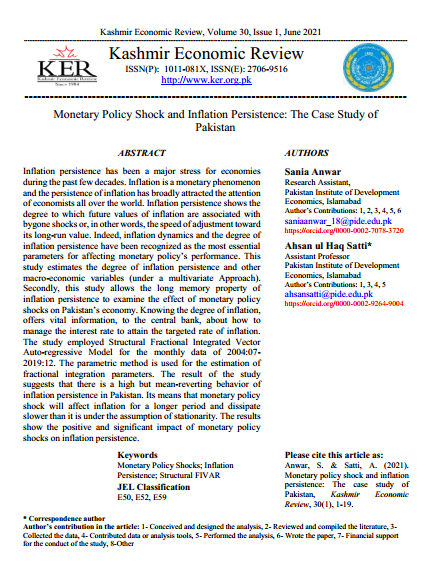Monetary Policy Shock and Inflation Persistence: The Case Study of Pakistan
Contenido principal del artículo
Resumen
Inflation persistence has been a major stress for economies during the past few decades. Inflation is a monetary phenomenon and the persistence of inflation has broadly attracted the attention of economists all over the world. Inflation persistence shows the degree to which future values of inflation are associated with bygone shocks or, in other words, the speed of adjustment toward its long-run value. Indeed, inflation dynamics and the degree of inflation persistence have been recognized as the most essential parameters for affecting monetary policy’s performance. This study estimates the degree of inflation persistence and other macro-economic variables (under a multivariate Approach). Secondly, this study allows the long memory property of inflation persistence to examine the effect of monetary policy shocks on Pakistan’s economy. Knowing the degree of inflation, offers vital information, to the central bank, about how to manage the interest rate to attain the targeted rate of inflation. The study employed Structural Fractional Integrated Vector Auto-regressive Model for the monthly data of 2004:07-2019:12. The parametric method is used for the estimation of fractional integration parameters. The result of the study suggests that there is a high but mean-reverting behavior of inflation persistence in Pakistan. Its means that monetary policy shock will affect inflation for a longer period and dissipate slower than it is under the assumption of stationarity. The results show the positive and significant impact of monetary policy shocks on inflation persistence.
Detalles del artículo

Esta obra está bajo una licencia internacional Creative Commons Atribución-CompartirIgual 4.0.

